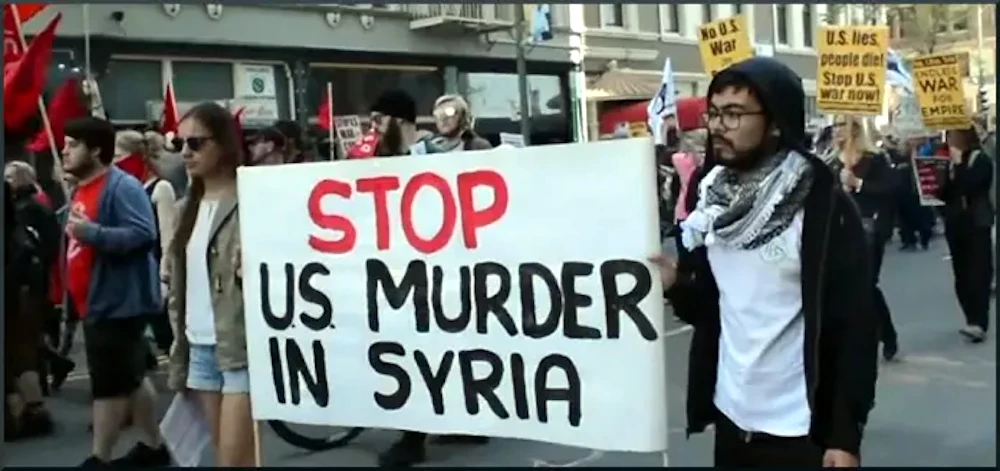by Jeremey Kuzmarov, published on CovertAction Magazine, June 30, 2023
Illegal U.S. bombing raids, brutal economic sanctions, and incredibly brazen theft by U.S. forces of 66,000 barrels of Syrian oil per day (80% of its total output) have visited a biblical-scale tragedy upon the Syrian people that has battered them virtually back to the stone age.
Following a devastating earthquake in February that displaced thousands of people and compounded the suffering of 13 years of war, UNICEF issued a warning that millions of children in Syria were at a heightened risk of malnutrition.
According to UNICEF, close to 13,000 children have been killed or injured in the Syrian conflict.
More than 609,000 children under the age of five are stunted from chronic undernutrition; 12 million Syrians do not have enough food to meet daily dietary needs; 6.9 million people are internally displaced, and 90% of Syrians are estimated to be living in poverty.
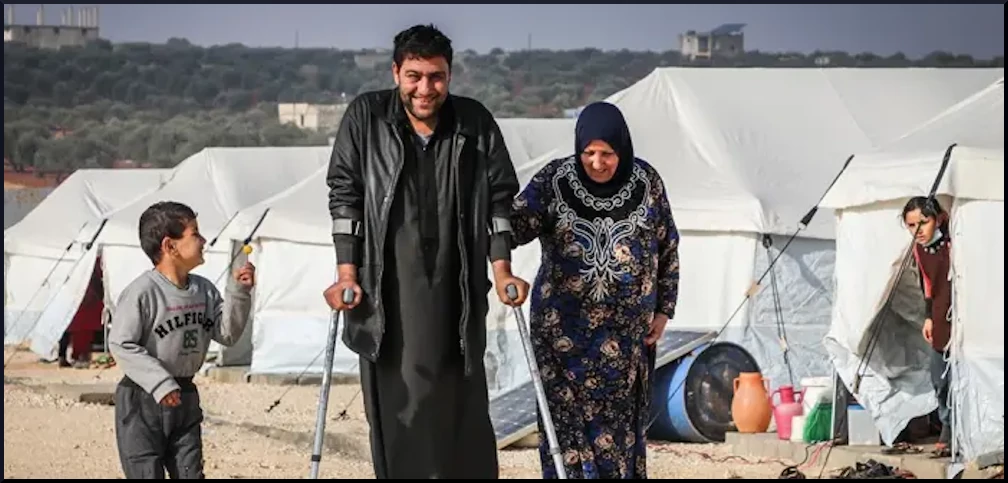
It claims that Assad started a war against his own people to preserve his family’s ruling dynasty, committed large-scale war crimes against his own people with Vladimir Putin’s support, and then stole relief aid following the earthquake and deprived people of needed medical assistance in order to punish those who did not support him.
In an April 60 Minutes segment, host Scott Pelley accused Assad of launching chemical-weapon and barrel-bomb attacks on his own people and reported that a hospital in a rebel-controlled area in northwest Syria had to be built underground so it could not be bombed by Assad.
Pelley interviewed a Chicago doctor who accused Assad of chemical-weapon attacks, and he interviewed members of the White Helmets, a humanitarian aid group exposed as an intelligence front, who claimed that Assad cruelly bombed rebel targets in the northwest just days after the earthquake.
Crimes Against Syria
60 Minutes’ narrative about Syria is contradicted by a new documentary, Crimes Against Syria, produced by Mark Taliano,[1] which draws more on Syrian perspectives.
See the documentary here.

The film goes on to detail the suppressed history in the West about how the uprising that triggered the war was initiated by jihadist terrorists supported by the U.S., Jordan, Turkey, Saudi Arabia and Qatar who attacked Syrian security forces, many of whom were armed only with sticks, while burning shops and cars.
Their aim was to weaken and destabilize Syria, overthrow Assad, and trigger a full-scale U.S. military invasion.
Crimes Against Syria includes footage of an interview with General Wesley Clark, who talks about visiting with a high-ranking general after 9/11 who told him of Donald Rumsfeld and Dick Cheney’s plan to invade and overthrow seven Arab governments starting with Syria.[2]
The neo-conservatives picked Syria because Assad was a secular nationalist who stood up to the Israelis and U.S. regional designs. His popularity stemmed from the fact that his regime provided the Syrian people with free health care and education and protected Syria’s sovereignty.[3]
Independent journalists Eva Bartlett and Vanessa Beeley are featured in the film, providing pictures of vast NATO weapon supplies that ISIS forces left behind in their headquarters after territory that they took was liberated by the Syrian Army.
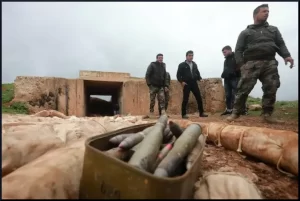
When an American living in Latakia saw a false report in the Los Angeles Times about how the Syrian uprising began, she contacted the journalist who wrote the story. The journalist admitted that she lived in Lebanon and based her report only on rumors supplied by anti-Assad forces.
The woman then tried to contact a Times editor whose information she had been provided, but the editor never emailed her back.
The media similarly misled Americans when it came to the chemical-weapon attack in eastern Ghoutta, Douma and other locations that were used as a pretext for the U.S. bombing of Syria.
A key source for the claims were the White Helmets—an al-Qaeda affiliate whose founder was a British intelligence agent.
A man interviewed in the film said that he lived in Douma where one of the chemical attacks was supposed to have taken place and never saw evidence of it; he thinks it was a play or show—a lie that never happened.
How was it possible, he asked, that people were walking around the area openly—without getting sick or killed when these chemicals were supposed to be deadly? And why would Assad use these weapons on his own people when he had liberated most of the country without them?
Other Syrians testified in the film to the widespread revulsion in the country for the foreign-backed jihadists who committed horrific atrocities, ranging from torture to beheadings to the seizing of medicine and food aid to the converting of hospitals into jails.
The Syrian Army—which included all ethnic groups in the country—was heralded for protecting the people from the terrorists and restoring law and order in areas they took back.
Russian troops were also looked upon favorably by Syrians for assisting Assad in freeing the country from foreign aggression.
The main pretext for the application of U.S. sanctions was the testimony of an alleged Syrian defector named “Caesar” who displayed images of tortured and mutilated Syrians, many of whom were actually Syrian Army soldiers.
When he appeared before Congress, Caesar wore a hood over his face to mask his identity and was brought there by his “case officer,” implying that he was working for the CIA.
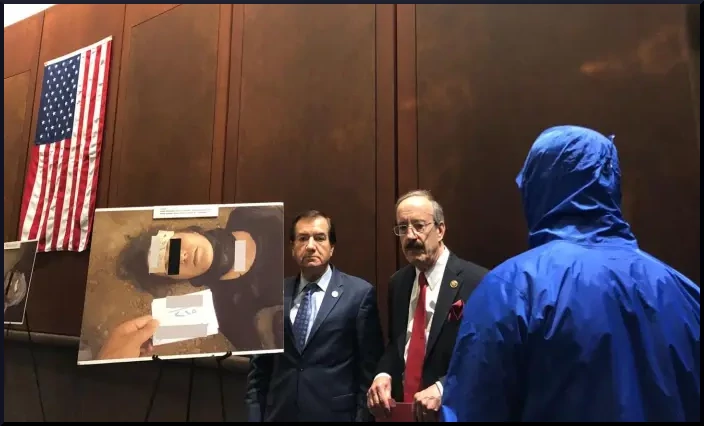
“U.S. Sanctions Have Brought Syria Back to the Stone Age”
’60 Minutes’ narrative about Syria was further debunked in March by the testimony of Syrian doctors before the International People’s Tribunal on U.S. Imperialism, which aims to spotlight the pernicious impact of U.S. sanctions on countries around the world.
These doctors emphasized the cruelty of U.S. sanctions on Syria, which have deprived its people of needed medicines and crippled its already war-ravaged economy.
Comparison was made with Iraq in the 1990s, where sanctions that were applied following the bombing of Iraq’s infrastructure in the first Persian Gulf War resulted in the deaths of half a million Iraqi children, according to Secretary of State Madeleine Albright.
Counter to what 60 Minutes claimed, the doctors said that it was jihadist rebels who had shelled Syrian hospitals and murdered other doctors, and destroyed pharmaceutical factories—which is what has made the country ill-equipped to deal with the on-going humanitarian crisis.

Electricity in the country was now sporadic and basic social services—excellent before the war—were severely reduced. Living standards were miserable and social cohesion was coming undone.
People had to endure long food lines, public transport was lacking and students could not study because their schools had been destroyed. Goods can no longer get in because of restrictions on Syrian airplanes and imports and exports are way down.
Much of the country’s oil had also been stolen, taken to Iraq and Turkey.

According to Hizla al-Assad, the earthquake in Syria showed the inhumanity of the Americans who prevented the delivery of needed medical and humanitarian aid into the country.
That inhumanity was also evident in the behavior of American occupying troops in the northwest, who kidnapped Syrian youths and dragged them unconscious for the crime of possessing a picture of Bashar al-Assad.
Trying to Destroy a Proud Anti-Colonial Tradition
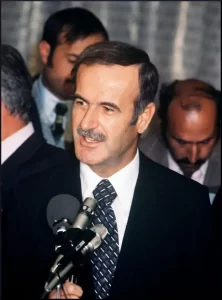
In 1948, Syria sent troops to confront the Zionist colonizers of Palestine and then, in the early 1950s, supported the Algerian struggle for independence against France, under the leadership of Shukri al-Quwatli, who was overthrown in a 1949 CIA-backed coup but won presidential elections in 1955 (the CIA then again tried to overthrow him but failed).
Bashar al-Assad’s father, Hafez, who ruled Syria from 1970 to 2000, supported many Arab and Third World liberationist movements and allied closely with the Soviet Union.
Bashar continued his father’s legacy by establishing Syria as a main conduit for Iran, Lebanese and Palestinian resistance movements fighting against Western imperialism and proxies like Israel.

Syria resisted the plan and was attacked accordingly, with Israel stealing the Golan Heights during the closing stages of the 1967 Six-Day War.
That Israel is the foundation for U.S. imperial power in the Middle East, and Syria is in Israel’s crosshairs, helps account for the long U.S. subversion campaign.
The latter’s deadly consequences are childishly blamed by the U.S. ruling establishment and media on a leader who is respected in Syria as an heir to the country’s proud anti-colonial tradition which in part, and ironically, mirrors America’s own.
- Taliano is a retired teacher from Ontario who previously authored the book Voices from Syria, while a Second Edition of Voices from Syria was co-authored with Syrian Basma Qaddour. ↑
- The other six were: Iraq, Lebanon, Libya, Somalia, Sudan and Iran. ↑
- The film acknowledges some grievances against Assad and that some of the original protesters were peaceful but emphasizes that the protest movement was hijacked by violent extremists backed by foreign interests bent on destroying Syria. ↑
Jeremy Kuzmarov is Managing Editor of CovertAction Magazine. He is the author of four books on U.S. foreign policy, including Obama’s Unending Wars (Clarity Press, 2019) and The Russians Are Coming, Again, with John Marciano (Monthly Review Press, 2018). He can be reached at: jkuzmarov2@gmail.com.
 Syria Support Movement solidarity with the Syrian people
Syria Support Movement solidarity with the Syrian people

